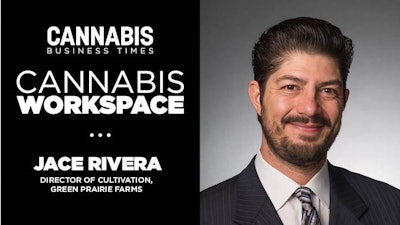
Indoor, outdoor, greenhouse or a combination: Primarily indoor, with some outdoor cultivation
Can you share a bit of your background and how you and your company got to the present day?
Cannabis has been in my family since the 1920s. My great-grandpa supported our family supplementing his coal miners’ wages [by] cultivating cannabis. I have been cultivating cannabis since 2006. It was mostly for family medicine and enjoyment. Our company started in 2015 as primary caregivers for children with cancer. We very quickly became overwhelmed with patients in need of “clean medicine.” I started providing education on the non-common methods of ingestion and the benefits of acidic cannabinoids, [and] this opened up a whole new way to help patients. Meeting Bryan Wachsman [and] John and Cassie Stinchcomb in 2018, I was given the opportunity to expand and bring our products and knowledge to Green Prairie Farms.
What tool or software in your cultivation space can you not live without?
Green Prairie Farms’ space is extremely simple. Keep It Simple (KIS) is the motto! I would say that my 40x jewelers loupe is one of the tools I could not live without! An essential tool in a good integrated pest management (IPM) program. When consulting, I tell all of the growers this is their number one tool to use!
What purchase of $100 or less has most positively impacted your business in the last six months?
Can’t get much in the cannabis industry for $100 or less. How about 20 pounds of salmon? It was used to make 1.5 gallons of fish amino acids (FAA). This Korean Natural Farming (KNF) input is being used at Green Prairie Farms’ grow in Tulsa, Okla. This batch of FAA will be enough for over 1,400 gallons—not bad for under $100!
What cultivation technique are you most interested in right now, and what are you actively studying (the most)?
KNF and JADAM Natural Farming have been my focus of cultivation and study for the last six years. I actively participate in local herb walks and do many collections of indigenous microorganisms (IMO) a year. I read a ton! Fermentation techniques are another topic of interest.
How has a failure, or apparent failure, set you up for later success? Do you have a “favorite failure” of yours?
Everyone runs into problems when growing cannabis; it’s how you deal with them that makes you a better grower. I have learned to respond and prevent many of the common and difficult pests and diseases associated with cannabis cultivation. I came up with the saying, “An ounce of prevention yields pounds.”
My favorite failure has been going through my transition from the use of any commercial products to being 99-percent sustainable in my growing technique. I have killed a lot of plants learning! I now am able to cultivate beautiful, healthy plants that produce amazing, clean medicine. I make all of the nutrients and pest management amendments that are used with a high focus on organic inputs.
What advice would you give to a smart, driven grower about to enter the legal, regulated industry? What advice should they ignore?
No. 1: Educate yourself. That is my answer for both questions. Any person entering the industry usually finds out that it is not all it seems and the best thing you can do is not be ignorant to the law and compliance regulations. I mean, after all, it is up to us to up hold this legal privilege.
There are a lot of really good people in this industry—I mean, really good. They will help you learn valuable secrets to the game and get you involved in some amazing activities. But there are a lot of shady people that will do whatever it takes to make a dollar. That includes illegal activities that can stir up trouble for the individual, company and industry.
How do you deal with burnout?
I do my best to review the expectations. It is easy to get burned out if you can’t see the light at the end of the tunnel. Setting checkpoints is another tool I like to use. It seems to give the little victories that make the big picture clear.
How do you motivate your employees/team?
I first and foremost believe in showing your appreciation for the work people do. A little gratitude goes a long way! The best manager I ever worked for told us, “I am only as good as the people that work for me. Please let me know if you need anything.” He told us that every week in staff meetings and always followed through.
I would never ask an employee to do a job I would not be willing to do myself. It is always a huge motivator when somebody gets in there and does the work with you.
What keeps you awake at night?
I have chronic refractory insomnia, so I usually don’t sleep much anyway. My brain doesn’t shut off so it can be hard to get a good night’s sleep. I miss our son; he passed away from a heroin overdose in 2018. He was 23.
What helps you sleep at night?
Reading and hash. I prefer heavy indica varieties; however, I usually just end up super high and not tired! I do not take any prescription medication for my insomnia, although it has been prescribed and recommended.

























